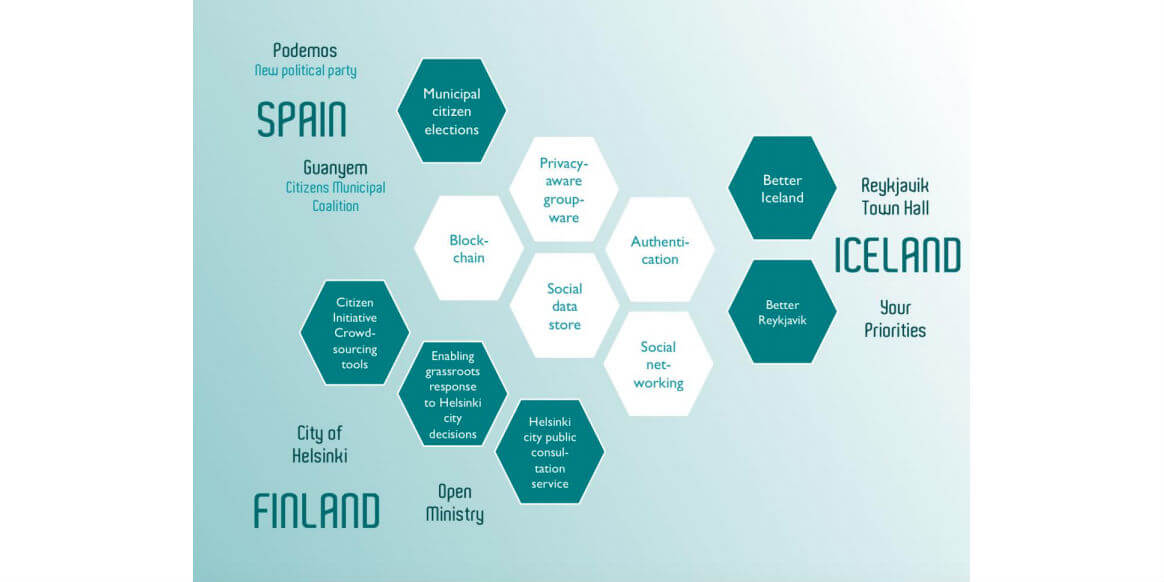
D-CENT, a European-wide project aiming to build an open, decentralized and distributed social networking platform for large-scale collaboration, is being supported by €1.905 million from the European Commission (EC).
Triggered in October 2013, the Decentralised Citizens ENgagement Technologies (D-CENT) initiative has received backing from the EC to build a distributed, federated and privacy-aware social networking platform where citizens would be able to discuss and share content, engage in deliberation, collective judgments and voting.
D-CENT released a first prototype in autumn 2014, and is looking to continue development and test its tools in pilot countries throughout 2015.
The organization will be running pilots experimentations in Iceland, Spain, Finland and Italy. Dubbed the Digital Social Currency Pilots, these initiatives aim to deployed blockchain-based complementary currencies to use in parallel with conventional ones.
Marco Sachy is the currency designer of the Dyne.org foundation, a non-profit organization that supports free access to digital knowledge for community empowerment.
Sachy, who conducts researches on Social Crypto Currencies and geo-localized market places for D-CENT, explained:
“D-CENT is going to prototype the Freecoin Toolchain as a set of features that are apt to advance the state-of-the-art in two domains of social innovation: complementary currencies governance systems and decentralized trust management systems.”
The four pilots experimentations in D-CENT can be summarized as followed:
Iceland: a blockchain-enabled municipal currency inspired by Libra Circuit, the SoNantes (France), and coupled with HullCoin (UK). The purpose will be to facilitate the usage of cryptographic blockchain technologies by co-designing ‘Social Kronas,’ a reward system for political participation integrated in Betri Reykjavik in collaboration with the Municipality of Reykjavik.
Spain: envision and facilitate the evolution of the Eurocat complementary currency, a project launched in Barcelona on April 2014, by decentralizing the storage and distributing the responsibility of service hosting and data custody.
Finland: a decentralized social remuneration system that can reward the contributions that members of Helsinki Urban-Cooperative Farm perform to the common interest of the cooperative, i.e. Multapaakku. This model will be also piloted in Milan, at Macao, an HUB for cultural workers of the city.
Italy: a decentralized currency for the cultural sector called Commoncoin that would measure engagement and that will shape reputation within the cultural industry network pilot in Milan.
“The common characteristic of the different pilots is the need to strengthen the democratic debate necessary to consolidate and preserve the management of economic transactions, especially those with a social orientation and impact, inside the local monetary circuit,” Sachy said.
He continued:
“It is only through a democratic and participatory deliberation system that citizens can collectively define bottom-up their social needs, also in terms of monetary needs, and inform the choices made not only on resource allocation, but also about investment in social objectives and ethical criteria, i.e. digital social currency experiments to foster direct democracy across Europe.”
The D-CENT project will be running until mid-2016 and is being supported by universities and prominent organizations from all parts of Europe. Partners include Nesta (UK), Citizens Foundation (Iceland), CNRS (France), Dyne.org Foundation (NL), Forum Virium Helsinki (Finland), and the Open University of Catalunya and Barcelona Media (Spain), among others.
D-CENT will be organizing a Round Table discussion on July 7, in Brussels, as part of CAPS 2015, an international event on Collective Awareness Platforms for Sustainability and Social Innovation.
The discussion will focus on questions such as: How can we transform the political system and devolve power to citizens? What kind of online tools and digital infrastructures are needed to truly empower citizens in the democratic context? What kind of self-governance models can we adopt to build the new digital commons?

